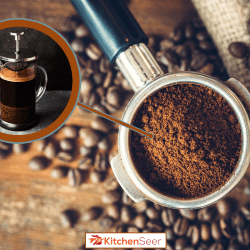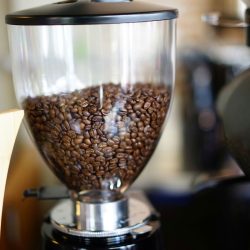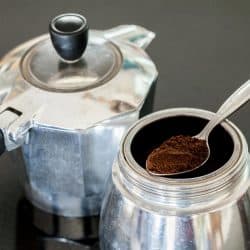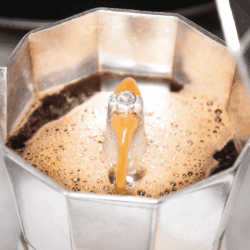French presses are functionally elegant coffee makers that are perfect for small kitchens with limited counter space. Perhaps you are considering purchasing one of these handy brewers, or you already own one and have wondered if filters are necessary? What benefit does using a filter provide? We've researched these questions and have found helpful answers to share with you.
Using a filter in a French press is advisable for making outstanding coffee free from bits of coffee beans. Most manufacturers have created filters built into the plunger to ensure that most of the grounds are filtered out of the coffee. Also, you could use a paper filter paired with the metal filter for added protection and, next to zero, grounds in the coffee.
Are you interested in learning more about French press coffee makers? Would you like to learn how to use a paper filter in the French press properly? Please continue reading as we have a lot of exciting information to share with you!

Why do French presses need filters?
There are several reasons why using a filter in your French press is necessary and wise. Firstly, without a filter, your cup of coffee would be filled with coffee grounds. Filters protect the coffee drinker from swallowing coffee bean grounds that are difficult to digest and cause stomach discomfort.
Most French presses do have metal filters to prevent these issues. Although bits of coffee grounds can easily slide through the metal filter, and they end up in your coffee up without additional filtering in place.
To remedy this issue, use a paper filter within the French press or filter your coffee after brewing it for a flavorful, smooth cup of coffee, free from grounds. Paper filters are not only helpful for removing coffee bean specks; these can help brew a safer, healthier cup of coffee.
According to a study conducted by the European Journal of Preventive Cardiology, the researchers discovered that unfiltered coffee contains diterpenes, compounds that can raise cholesterol in humans. Also, the researchers stated a cup of unfiltered coffee contains 30 times more diterpenes than a cup of filtered coffee. Although this study was observational, it doesn't prove that unfiltered coffee versus filtered coffee is ideal for the human body. However, It does offer insight into the importance of filtering coffee.
Wondering if your immersion blender can grind coffee beans? Click here to read our article on the topic.
What Types Of Filters Are Used In A French Press?
The vast majority of French press models are manufactured with a built-in filter positioned at the top of the plunger and a metal filter at the end of the plunger. Both filters remove any specks of grounds out of the coffee and assist in pouring without issue.
Paper filters are secondary filters for French presses shaped like a circle and fit at the bottom of the metal filter located on the plunger. Using a paper filter will remove any specks of coffee that remain after flowing through the other filters.

How Do You Use A Paper Filter In A French Press?
The round coffee filter designed for French presses is the easiest and simplest option. Place the round filter at the bottom of the metal filter and when the plunger is pressing the ground coffee beans, leave the plunger pressed to the bottom of the press. Then pour your coffee. Doing so will allow the two filters to be effective as possible.
Another option is to unscrew the filter from the plunger. Next, place the circular filter between the top of the plunger with the metal filter underneath. This option keeps the paper filter from moving but does require a few extra steps.
DIY paper coffee filters for French presses
If you have coffee filters for countertop coffee makers, you could trace the circumference of the French presses metal filter and cut a filter to fit. Next, cut a small hole in the middle of the filter with the tip of the scissors or an Exacto knife and follow the steps listed above for using a paper filter.
Reusable method for filtering French press coffee
Consider using a reusable flannel coffee filter to remove any unwanted coffee ground debris from your cup of morning joe. Using a flannel coffee filter is easy. Firstly, brew your coffee in the French press without an additional paper filter. Secondly, place the flannel coffee filter above your coffee cup or carafe and pour the coffee from the French press into the flannel filter.
Cleaning the flannel filter is easy. After use, empty the coffee grounds into the compost or trash. Wash the flannel with cold water and allow it to dry fully before putting it in the cabinet.
Click here to view a Reusable Flannel Coffee Filter at Amazon.
How Long Does French Press Filters Last?
The metal filters attached to the coffee plunger last from months to years, depending on the quality of the model and frequency of use. Also, keeping the French press clean and dry in between uses increases the longevity of the filter and press overall.
Click here to view French press metal filter replacements at Amazon.
Paper filters are created from the same materials as a conventional coffee maker's filter, and the main differences are the shape and size. Discard the paper filter after each brew for the best-tasting coffee. Coffee filters could be reused twice or three times after using the filter is washed with cold water and dried. After the third use, it is advisable to throw it out.
Click here to view round paper coffee filters at Amazon.
Perhaps you have wondered what the differences between a French press and an espresso maker are?
Click here to read our article that explains the differences in detail.
When Should A French Press Filter Be Replaced?
According to Grosche, the metal filter should be replaced twice a year for maintenance. If the metal filter starts to fray at the edges or there is a visible hole in the filter. Replace it as needed. Also, if you dropped the plunger, check the filter; if the filter was damaged by falling onto a hard floor or surface, it could create small breaks in the filter and need to be replaced.
How often should a French press be cleaned?
The French press should be thoroughly cleaned after each use to avoid the risk of clogging or mold growth. If the press sits with coffee grounds and standing coffee for even a day or two, harmful microbes could start to multiply, and mold could start to grow. Most French presses are dishwasher-friendly for easy upkeep. If yours is not dishwasher friendly, wash it in the sink.
Firstly, remove the coffee grounds. Next, rinse the beaker and plunger into the sink with cold water. Unscrew the filter from the plunger. Wash the beaker and the disassembled plunger with dish soap and a soft scrubby. Avoid using metallic or harsh scrubbers. Those could scratch the beaker and damage the metal filter. Rinse with warm water and dry with a kitchen towel. Reassemble the plunger once all parts are dry. Store the French press covered in a cabinet or pantry.
Click here to view a dishwasher-safe French press at Amazon.
Suggestions and tips for using a French press
Suppose you purchase your coffee beans whole and grind your beans at the grocery store or in a handheld coffee grinder. Always grind your beans on the French press setting. If that setting is not an option, use the course ground setting for similar results. The consistency of the ground beans will be ideal for the French press.
If the French press beaker isn't as aesthetically pleasing because of unsightly coffee stains. Wash the beaker with dish soap and rinse with warm water. Then pour 1 cup white vinegar in the beaker and fill to the top with cold water. Allow the beaker to soak for a few hours, then rinse thoroughly. The white vinegar should remove the stains, and the beaker should have regained a tidy appearance.
If the French press has been sitting unused for ages and it is rusty or moldy. Discard it immediately and purchase a new one. Any small appliance that has mold or rust is not safe for preparing food or drinks.
The coffee grounds are easy to remove and place in the compost or trash. Never pour coffee grounds down the sink. Coffee grounds could clog the pipes easily.
In closing
French presses are not only great at home for daily use, but these presses are also excellent for camping and traveling. Most French press models can fit easily into a backpack or suitcase. We hope this article has helped further your knowledge base of French press ownership and usage. Please visit Kitchenseer.com in the future for more trustworthy information!





![A black Stanley French press next to a water heater and coffee mugs, How To Use A Stanley French Press [Step By Step Instructions]](https://kitchenseer.com/wp-content/uploads/2022/09/A-black-Stanley-French-press-next-to-a-water-heater-and-coffee-mugs-250x250.jpg)




